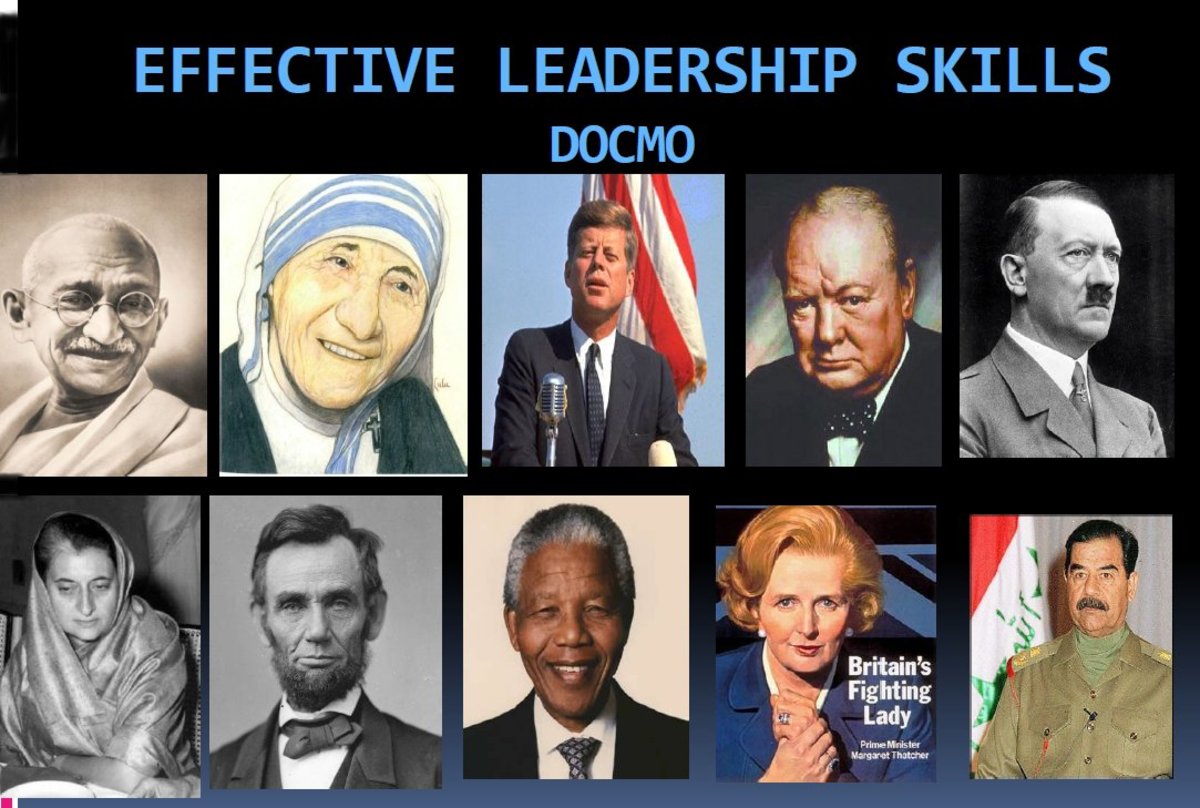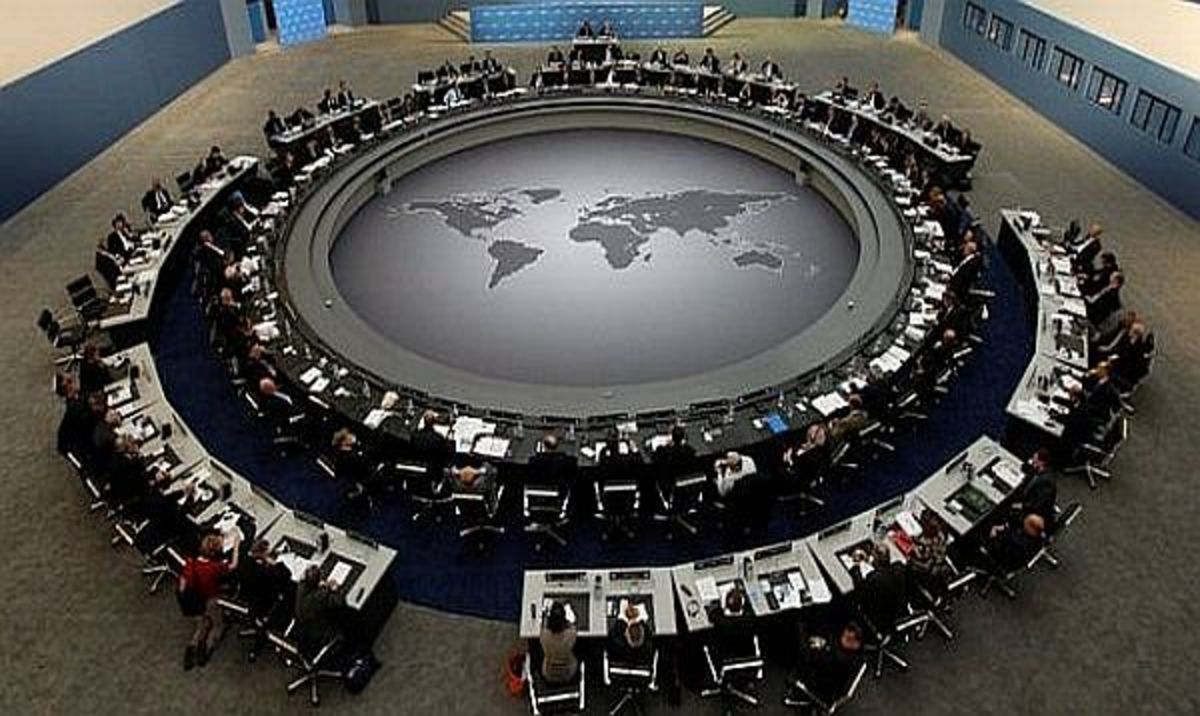Leadership and Personal Satisfaction

Like everyone else who is employed by another, I work in order to receive a monetary weekly amount which will grant me the ability to pay for the basic necessities of maintaining life. However, the nature of the job I choose to devote my energy toward, is what I believe will bring me the rewards of personal satisfaction. I've never been able to work in a capacity where the job was simply viewed as a means to a paycheck, though I've known many people who are content to wile away forty hours a week at a meaningless job simply because they do not associate their employment with achieving their brand of personal satisfaction. They would much rather dedicate their energies and attentions to areas outside employment.
For me, the nature of my employment contributes to my overall sense of pride and achievement. While I do not define my entire existance on the work I carry out for pay, it is representative of a piece of all that comprises my whole being. My choice of employment is a statement to the world regarding who I am and what constitutes my values and morals. Therefore, any job I undertake, must have the components I deem necessary for me to feel that it is contributing to a life well spent. Anything less will eventually bring me to a point of dissatisfaction and diminished sense of pride.
I've had great fortune in choosing well when considering employment through the years, but just as often, I've experienced great misfortune. Not all that long ago, I had applied for a position as a restaurant manager in a local fast food establishment. It had been several years since I had worked in the industry as I had previously decided to move on to more intellectual pursuits.
After having spent the past several months recuperating from cancer surgery, I was feeling very restless and pent up. I decided that I needed to get back to work, but I wanted the kind of work that would require me to be active, to engage in use of physical activity as well as using my mental abilities. I happened to visit this particular establishment with my boyfriend and his children. Initially, I had put up a fight about eating there as I'd had numerous bad experiences in the past. But, my Honey was insistant because we were running late for an appointment, and I finally capitulated under the pressure.
It wasn't very busy for a Saturday morning, so I expected that we would receive at least moderate service. We waited for 10 minutes to get our food, and when it came it was missing a few items, in addition to the potatoes being cold and greasy. I made allowances for the missing items since the young lady who had taken our order seemed to be new and unsure of herself. I couldn't dismiss the lack of heat in the food that was delivered and so I asked for the mistakes to be corrected.
While hurriedly eating our meal, I was treated to an experience rarely found anywhere, let alone a fast food restaurant. The manager coming on duty breezed through the front door as though she was ecstatic about finally arriving to start her business day. She greeted people along the way, straightened tables, stopped to chat and in general, was a pleasure to behold. The brightness of her beautiful smile was slightly less than the dancing twinkle in her eyes. I was impressed!
Eventually, she came to see how we were doing and I had the opportunity to speak to her regarding our service. She was very apologetic and more than gracious with her offers to entice us to come back and give them another opportunity to “wow” us. I didn't need any freebie enticements. I was already being lured by her brilliantly welcoming personality.
I had seen For Hire ads for several weeks but had no intention of checking them out. To me, my past bad experiences had spoken volumes about the nature of the company and their lack of concern for the public to whom they catered. In a too brief ten minute span, the manager had accomplished the task of wiping the slate clean. I had spent many years as a General Manager in a fast food restaurant and from my perspective, if a manager came in with that kind of attitude on a Saturday morning, then the company was doing something right. It was a company I intended to check out.
I took the job fully expecting to experience the usual hardships of running a restaurant, especially one which was experiencing serious problems with lack of training, lack of cleanliness, and a total lack of service. The rosy glow associated with meeting the Saturday manager was not dimmed by the prospect. It seemed the people in charge were aware of the issues to be dealt with and were taking the necessary steps to correct the problems.
This is where the issue of personal satisfaction comes into play. In the past, I had taken another position just like the one I was currently facing. It had turned out to be a great investment in my time and energies. I worked for a man who understood the value of relinquishing the reigns to the people he paid for doing the daunting task of running a profitable restaurant. He hired the right people based on experience, track record, and personal reputation. Since he trusted his own decisions, he avoided micromanaging at all costs. As a result, his business grew from one store to three inside of two years, with a fourth in the planning stage when another opportunity in his life brought about the decision to sell for considerable capital gains.
My experience with him and his company was so rewarding that my job never felt like work. I loved my job so much, I found it difficult to stay away even on my days off, though I knew my staff was capable of doing just as well without me. I had been free to train them to my satisfaction, and I was rewarded by their constant successes. Often I was accused of being a workaholic, but the truth was really that I was self indulgent. I was gorging myself with personal satisfaction in a job that afforded me the opportunities to achieve it.
Now, here I was, several years later, expecting to experience the same euphoric sense of pride and achievement. I am extremely verbal about my views and beliefs irregardless of the situation in question. I had no difficulty posing questions and seeking satisfying answers before I made the decision to actually accept the position. Based on documented statements regarding their mission and the chosen management style they wished to lay as a foundation for future successes, I was sure I was taking a position in which I would find immense satisfaction. I had no doubt that the ownership of the business was in tune with my own personal values and beliefs.
If I were interested in making a surface judgment, I would simply say I was wrong about my initial assumption. However, that's just not the case. To this day, I believe that company truly had the same ideals, values, and morals. Unfortunately, they did not know how to execute what they wanted to achieve. While they embraced the ideas of the principles they verbalized, their methods were in constant conflict with what they hoped to achieve. For any thought to come to fruition, a plan must be formulated followed by engagement of right action.
The District Manager, whom I shall refer to as Chief Misunderstanding (shortened to Chief), was either a very likeable man or one to be hated, depending on who was judging. I wasn't subjected to him in person, until I had already put in three days of work. During those three days, I was appalled by the conditions I found. The store was dirty beyond comprehension. The crew was short-staffed by approximately 10 people. The management staff consisted of the manager I had already met, an opening breakfast manager who made it quite clear she did not want to remain a manager for much longer, a dedicated closing manager who surely didn't find her responsibilities to be worth a real effort, and a borrowed General Manager who was traveling ninety minutes in an attempt to keep the store running. At the time I was hired, a decision had only recently been made as to who would be the appointed General Manager for that location. When I first met her, she was very enthusiastic about the efforts being made in turning the store around. She seemed full of energy and ideas. Within two days of working there, I knew she wouldn't last. She was too inexperienced for the task at hand and much too caught up in personal dramas to give the amount of attention necessary for accomplishing the mega task before her. Within seven days of my hire, she was no longer working there, by her own choice. She couldn't handle the demands of the job.
After a month of working there, I was severely frustrated and seriously reconsidering my position. The borrowed GM was overworked, exhausted, and showing her mean streak. As a human being, she is generally a very nice, kind, and thoughtful individual, but circumstances had stretched her to her limit and her exhaustion was being felt by all around her. For her to accomplish all that was laid before her, she would need to work a thirty hour day. “Saturday” and I attempted to take on as much of her load as we could, but we hadn't received enough proper training to be of much use to her.
Management is management. The training we were in need of was in relation to that particular company's procedures, the related administrative duties, and operation of equipment, including their computer system and software. GM never had time to show us any of those things as she was busy doing the job for which she was supposed to be training us. It was a runaway train with only disaster looming ahead if something wasn't done soon.
The longer I stuck it out, the more apprehensive I became. After more than two months of employment, I had only completed the first1/3 of the prescribed training program due to a failure of follow through on upper management's part. I was determined to be fair about my assumptions and often put aside negative thoughts regarding the company's commitment to upholding their stated ideals. When I had taken the job as a manager, I wasn't interested in shouldering the responsibility for the success of the store, but I have standards of conduct to which I adhere. I wanted things to change, therefore I would need to be an instrument in helping to bring about that change. After serious thought and deliberation, I informed the powers that be of my willingness to take on the store if they had no one else in line.
My plans of quietly enjoying my free time in personal pursuits was put on hold. Though I had never intended to take another General Manager's position, I took on the task because I needed to be true to my values and beliefs. In my determination to remain fair and refrain from hasty judgment, I failed to accept the warning signs for what they represented. Eventually, even I couldn't find excuses or make more allowances for what was transpiring.
The Chief was a very intelligent man, intellectually speaking. He had a thirst for knowledge regarding interpersonal skills and cultivating leadership abilities. He could be very charasmatic, exuding confidence and a positive attitude toward almost impenetrable obstacles. His sense of humor was unsurpassed. Where he fell down, every time, was in his delivery. He simply did not know how to convey his thoughts in a believable manner that could be trusted by those to whom he was making a delivery. The perception most of us had about him was not the most flattering. It painted him as a somewhat volatile, inconsistant personality with a tendancy toward empty flattery aimed at achieving a manipulation of some sort.
He was very quick to recite methods and principles he had learned from much reading and the mentoring he received from his superiors. Unfortuately, when he attempted to pass the information on, it came off as self-serving. For those of us who understood and embraced the very principles he was espousing, there was an overpowering urge to scratch our heads and try to analyze his convoluted messages. The end result being that we were faced with making a choice of what to believe about his intentions. Neither of the two possibilities were flattering. If we acknowledged that he was a very intelligent man with a clear understanding of the principles he wanted us to use as guideposts, we could only believe that his personal inconsistancies in adhering to said principles were an indication of his true feelings about our worth in the organization. In other words, we were not deserving of receiving from him the very treatments he expected us to deliver to our own teams. That is certainly not a description of the type of personality with whom I care to expend my energy.
The other option was that he didn't truly understand the principles or the manner in which they should be employed. This left the nagging question of how one can be followed as an effective leader if he doesn't seem to have a clue regarding the nature of the road being traveled. I struggled with this issue for several months, becoming more and more frustrated by my failure to establish a connection in our thinking.
Chief was enamored of a personality assessment tool known as DiSC profiles. The job applicant answers a series of questions designed to pinpoint their answers under four distinct personality types. There are no right answers, however, the profiles are used to determine the likelihood of success in the intended position. Personally, I don't believe there is any one personality more likely to succeed than another depending on the situation at hand. For instance, a troubled company would probably benefit from an individual who is determined, aggressive, and pioneering at its head, with a few individuals who are capable of communicating the needs and requirements of action to the laborers who will be assigned the task of carrying out the actions. Those laborers would probably best be made up of individuals who are steady workers, who are patient and resolved, along with those who are structured and dedicated to producing quality work. However, if the company is poised for growth, then the workforce would do better with a higher incidence of determined and aggressive individuals who could be promoted as needed through growth demands.
An opportunity presented itself in which true communication and an accurate understanding may have been reached had Chief utilized my DiSC profile for the proper purposes. Unfortunately, he made untrue assumptions about my motivations based solely on the profile. Unbeknownst to him, his actions and words betrayed his own motivations. He was attempting to persuede me to his way of thinking by appealing to certain aspects of the personality profile he believed was representative of me. The truth is that the profile was fairly accurate, however he completely neglected to take into consideration that a woman of my age and experience will learn the value of embracing behaviors which are not natural behaviors normally associated with specific personalities. Because I am very aware of my own weaknesses and tendancies, I check myself regularly, working very hard to incorporate the learned behaviors into my personality.
During this particular discussion, he was waving aside my very valid concerns by trying to convince me that my reasons for making the observations were not my real and true reasons. He actually tried to convince me that he knew the truth of my thoughts which were very different from what I was attempting to communicate to him. In other words, I'm a mindless twit who hasn't a clue why I do or say the things I do, and as such, I need to be told how to think and act. Now those weren't his words, but it was the message he delivered. If one is to lead effectively, he or she must refrain from making concrete statements without the ability to prove the truth of the statement. As there is no way to know another's thoughts, his statement of false fact is reduced to nothing more than an unproven theory. Chief had repeatedly made comments regarding his highly keen ability to understand people. His insistance of correctness in relation to what I knew to be incorrect only served to prove to me that he did NOT have an ability to understand people.
Another tool Chief found invaluable was a book from the “One Minute Manager” series titled "Leadership and the One Minute Manager", by Ken Blanchard, co-authored by Patricia and Drea Zigarmi. There is no doubt that this book is a valuable tool for new managers. It serves to outline the many different hats managers must wear, and in order to wear them well, they must understand how, when, and which to put on. For those of us who have been wearing those hats for many years, it may give some additional insight about situational leadership, but if we've been working in managerial positions for many years, it is a likelihood that we've already achieved an understanding of the principles outlined.
For me, the required reading didn't upset me as I had owned the book for over twenty-five years. It was one of the first management how-to books I had ever purchased. However, at this late stage of my career, the style of writing was a bit juvenile for my tastes. The message is still good, but forcing myself to re-read about principles I already lived by, struck me as a waste of my valuable time. That may sound pompous, but the situation would have been better served had my experience and track record been taken into consideration when assigning reading materials.
I wasn't opposed to refreshing my memory, by any means, but when I had informed the Chief that I had already consumed the book years before, I was completely unprepared for his reaction. By his reactional behavior coupled with his words , I concluded that this man I was expected to refer to as my leader, didn't truly understand the principles of situational leadership himself. It probably would have served the entire team better, had he been the one to re-read the book.
In my estimation, he should have engaged me in a conversation regarding the messages in the book. Once satisfied that I certainly did understand the principles, perhaps he should have recommended something else that would broaden my knowledge base. The mistake made here was that he assumed I was like so many of his other managers who needed to be directed to seek out knowledge, rather than simply supporting me in my self-motivated efforts and coaching me about other topics for which I may have needed additional information.
For anyone who hasn't read the book, there are four specific leadership styles; directing, coaching, supporting, and developing. Knowing when to use each style and with whom it will be most beneficial is essential to developing great leadership skills. The funny thing about this particular story is that I had revisited the book the very day I found out it was required. That was when I discovered how advanced my tastes in reading material had become over the years. Had the man stopped to listen to what I was telling him, he would have understood that the task was already accomplished rather than assuming that I simply didn't want to read it.
There were many incidents of conflicts between the Chief and myself, but another one stands out very clearly in my mind. I had reached a point where I had to make a decision about continuing in a job where I had absolutely no sense of achievement, or cutting my losses and finding a more rewarding position. Under less than admirable conditions, I brought up my concerns. Even though I had repeatedly attempted to discuss the issues on previous occasions, he seemed totally bewildered by my insistance that he and I had different visions regarding the direction leadership should be taking to steer the failing business toward calmer waters. And then he verbally slapped me in the face.
He asked me how I would like for him to manage me. Even after a year of contending with him, he was still able to astound me. I sat there silently for several minutes just staring at this man who was constantly spouting off about leadership and understanding others' perspectives, before forming my response. I did not want to be “managed”, preferring to be led or perhaps mentored.
I was careful with my words. In a previous, somewhat friendly conversation, I had alluded to the fact that I don't respond well to manipulation. I find it counterproductive and usually the end result is not in the best interest of the folks being manipulated. Manipulation is self-serving and will create distrust of the person pulling the strings. I, personally, do not engage in use of it and prefer to be accorded the same respect. In this instance, the meaning of being managed was too close to being manipulated, or handled.
From my own, personal perspective, we do not manage people. We lead them. We show them the way to the established goals. We model the behaviors we would like them to demonstrate and duplicate. Management is for situations. It is a selected style used in the controlling of influences on the outcome of our efforts. If we use the term “manage” when dealing with people, we are effectively reducing them to inanimate objects to be used so long as they are convenient to our cause. When we take the view of leading people, we are acknowledging their ability to make personal decisions about their journey. We supply them with valid options to consider and allow them the use of their minds to accomplish tasks we've set before them. By providing leadership to our team, we are creating a source of incredible achievement ability that will only continue to expand so long as we continue to lead.
I have never in more than thirty years of management found a time when an act of manipulation or control upon people carried lasting rewards. Certainly, more often than not, immediate rewards were gained, but such gains do not have the ability to be sustained over a long period of time and will eventually turn in upon themselves to become liabilities. While fear over the loss of a job or the refusal of a good review may serve to spark a wave of increased productivity initially, it will eventually burn out to be replaced by resentment and distrust, causing the opposite reaction. Low morale can never be combatted by manipulating the people who are already suffering. Eventually the only option left is to replace those people and incur increased turnover costs. Make no mistake, news certainly does travel fast and a bad reputation for using and abusing people is not an easy thing to rectify.
One day during a meeting between myself, the Chief, the Chief's supervisor, and the owner, the topic of my writing abilities was discussed. Under ordinary circumstances, I don't have a problem with discussing my written views. After all, I wouldn't write about them if I didn't believe them myself. However, I was uncomfortable with the topic for several reasons, the main one being that I didn't feel as though they accepted that I truly operated my life on the principles of which I write.
Chief commented on his preference to reading my pieces as opposed to being subjected to my verbalizing my thoughts. I laughed along with everyone else because, actually, it was a funny statement. He was in good company where I was concerned because I absolutely hated getting caught up in no win conversations with the man. During the discussion he stated that he loved my writing. He loved the style and the approach to the topics. He said he looked forward to each new piece. He said he preferred reading them as opposed to hearing about them because they were concise and to the point, staying on track with a flow of thought which took one from point A to point B. He believed this ability to condense my thoughts into concise words of such clarity was due to the fact that I could edit what I was saying. He believed the final written piece was a product of rethinking and reworking my words in order to achieve the targeted message.
I quickly responded by informing him that I never edit the content of my writing. I don't start writing unless I have an idea, a message, a thought to share. I begin and simply allow the thoughts to form into the words which seem to flow directly from my mind to the, er, computer. The only editing I do is for grammar and punctuation. I rarely revise my words unless I find a run-on sentence.
The difference, I told them all, was the fact that my written word couldn't be interrupted by innuendo, assumptions, or challenges. Chief had no choice but to read it from start to finish if he wished to learn the message. There was no opportunity for wandering from the path, as the words were already said and printed. From my perspective, the reason he enjoyed what he was reading was simply because he had to give my thoughts the opportunity to be presented in full before forming any opinions about the message. There was no reason to feel challenged as there was no one there to whom he felt pressured to respond.
As I come to the end of my example, I find that I am filled with a sadness over the lost potential of what could have been. Though the two of us seemed to always be at odds, there was a potential for both of us to individually and through teamwork, achieve a great deal of personal satisfaction and accomplishment. To this day, I am torn in regards to my final view of what motivated him to behave in so many erratic and inconsistant ways. I finally came to the conclusion that the reasons were mixed and varied. Mostly I believe he was a victim of his own ego.
Some of his behavior was simply an earmark of the era in which he was raised, while some was a result of him having been permitted to go unchecked for too long. It appeared that he thought of himself as above and beyond behaving and utilizing the same principles he expected others to embrace. I shoulder some of the responsibility for our failure. Through my observations of him, coupled with my interpretations of his actions, which are based in past experiences, I increasingly balked at following him as my leader. I became reluctant to travel down the path he was choosing because it seemed to me that it would be necessary to compromise my principles in order to do so. There is no reward great enough to entice me to sell my soul.
Even as I write this, that particular store's location is still struggling. Chief is still attempting to bring order to chaos. And I am left wondering how Chief would present his perspective of what had transpired in our aborted professional relationship.
If you found this information helpful, please pass it on by clicking the Tweet, Like, or +1 button provided at the top of the page.
- Blurring the Lines Between Work and Play
Arnold J. Toynbee, an economic historian, stated that "the supreme accomplishment is to blur the line between work and play. But just how does one go about doing that? Controlling our thoughts is the first step in that direction. - Humble Pride
An examination of the true meanings behind being humble yet maintaining pride in one's accomplishments. Too often we confuse our own feelings of inadequacy with the need to remind others of their responsibility to remain humble in the faces of their - Success or Failure?
If you're wondering why your teams aren't succeeding as you envision, the problem may reside in the team players, as well as in the manner you supervise. This article examines briefly one of the biggest reason for a team's failure...that of the disgr - The Need To Be Right
The Need To Be Right takes a look at what causes both skeptics and those who believe in a cause to become so extreme as to allow emotions to cloud better judgement.







